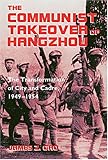The Communist Takeover of Hangzhou : The Transformation of City and Cadre, 1949-1954 / James Z. Gao.
Material type: TextSeries: Studies of the Weatherhead East Asian Institute, Columbia UniversityPublisher: Honolulu : University of Hawaii Press, [2004]Copyright date: ©2004Description: 1 online resource (350 p.)Content type:
TextSeries: Studies of the Weatherhead East Asian Institute, Columbia UniversityPublisher: Honolulu : University of Hawaii Press, [2004]Copyright date: ©2004Description: 1 online resource (350 p.)Content type: - 9780824827014
- 9780824861957
- 951/.242 22
- JQ1519.A5 G38 2004
- online - DeGruyter
- Issued also in print.
| Item type | Current library | Call number | URL | Status | Notes | Barcode | |
|---|---|---|---|---|---|---|---|
 eBook
eBook
|
Biblioteca "Angelicum" Pont. Univ. S.Tommaso d'Aquino Nuvola online | online - DeGruyter (Browse shelf(Opens below)) | Online access | Not for loan (Accesso limitato) | Accesso per gli utenti autorizzati / Access for authorized users | (dgr)9780824861957 |
Frontmatter -- Contents -- Acknowledgments -- Abbreviations -- Introduction -- 1. On The Eve Of The Takeover -- 2. Training The Cadres -- 3. The First Efforts -- 4. One Step Back, Two Steps Forward -- 5. The Korean War And The City -- 6. The Trial Of Strength -- 7. Women Cadres -- 8. The ''Geneva Of The East'' -- 9. Conclusion -- Notes -- Glossary -- Selected Bibliography -- Index -- About The Author -- Studies Of The Weatherhead East Asian Institute
restricted access online access with authorization star
http://purl.org/coar/access_right/c_16ec
Existing literature on the Chinese Revolution takes into account the influence of peasant society on Mao's ideas and policies but rarely discusses a reverse effect of comparable significance: namely, how peasant cadres were affected by the urban environment into which they moved. In this detailed examination of the cultural dimension of regime change in the early years of the Revolution, James Gao looks at how rural-based cadres changed and were changed by the urban culture that they were sent to dominate. He investigates how Communist cadres at the middle and lower levels left their familiar rural environment to take over the city of Hangzhou and how they consolidated political control, established economic stability, developed institutional reforms, and created political rituals to transform the urban culture. His book analyzes the interplay between revolutionary and non-revolutionary culture with respect to the varying degrees with which they resisted and adapted to each other. It reveals the essential role of cultural identity in legitimizing the new regime and keeping its revolutionary ideal alive.
Issued also in print.
Mode of access: Internet via World Wide Web.
In English.
Description based on online resource; title from PDF title page (publisher's Web site, viewed 02. Mrz 2022)


